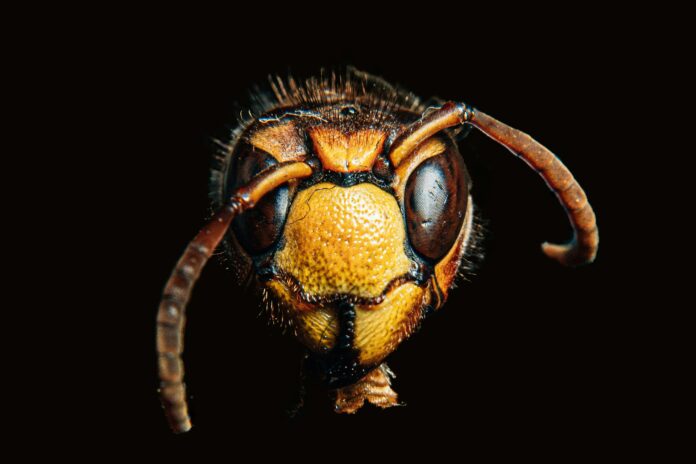UK’s chief plant health officer urges public to report sightings of Asian hornets to protect honey bees and other pollinators
As the summer season approaches, the UK’s chief plant health officer has called for increased vigilance in reporting sightings of Asian hornets. These invasive insects pose a significant threat to honey bees and other insect pollinators, although their risk to human health is comparable to that of native wasps and hornets. Beekeepers and the general public are urged to stay alert and report any sightings promptly.
Asian hornets, easily identifiable by their distinctive dark bodies, wide orange stripes on the fourth abdomen section, and yellow leg ends, are larger than native hornets but smaller than European hornets. The average size for Asian hornet workers is 25mm, compared to 30mm for European hornets. Sightings can be reported via the Asian Hornet Watch App, available on both iPhone and Android devices.
Embed from Getty ImagesLast year saw a record number of Asian hornet reports in the UK, with most sightings occurring in Kent. The Animal and Plant Health Agency’s National Bee Unit destroyed 72 nests in 56 locations, a testament to the growing concern over the spread of these insects. This spring, the unit implemented additional trapping measures in high-risk areas, such as Kent, East Sussex, Devon, and North Yorkshire, to prevent queens from overwintering and establishing new colonies.
Nicola Spence, Defra’s chief plant and bee health officer, emphasized the importance of early detection and rapid response in combating the spread of Asian hornets. “By ensuring we are alerted to possible sightings as early as possible, the public can help us take swift and effective action to stamp out the threat posed by Asian hornets,” Spence said. She added that while Asian hornets do not pose a greater risk to human health than other wasps or hornets, their potential to damage honey bee colonies and harm other pollinators is significant.
The early trapping efforts are a crucial part of the surveillance and eradication strategy. These traps are designed to capture Asian hornets while allowing non-target invertebrates to escape. The strategic placement of these traps aims to intercept hornets before they can establish new nests.
To report sightings, individuals can use the ‘Asian Hornet Watch’ app or Defra’s online report form. Alternatively, sightings can be reported via email to [email protected], preferably with a photograph if safely obtainable. Identification guides and further information are available on the gov.uk sightings page and BeeBase for those who keep bees.
It is crucial to avoid approaching or disturbing nests, as Asian hornets may become aggressive if they perceive a threat. Instead, individuals should focus on reporting sightings to allow authorities to handle eradication efforts safely and effectively.
The public’s role in reporting sightings is vital in preventing the establishment of Asian hornets in the UK. The collaborative effort between beekeepers, the general public, and health authorities is essential in protecting the delicate balance of local ecosystems and ensuring the survival of crucial pollinators.
As we move into the peak season for Asian hornet activity, continued vigilance and prompt reporting will be key to managing and mitigating the risks posed by this invasive species.
Analysis
The increased vigilance and reporting of Asian hornet sightings reflect a significant concern for ecological and agricultural health in the UK. From a political perspective, the proactive stance taken by Defra and the Animal and Plant Health Agency underscores the government’s commitment to biosecurity and the protection of native species. This approach aligns with broader environmental policies aimed at preserving biodiversity and preventing the introduction and spread of invasive species.
Sociologically, the involvement of the public in monitoring and reporting sightings highlights a community-based approach to ecological management. This collaborative effort fosters a sense of responsibility and awareness among citizens regarding the impact of invasive species on local ecosystems. The use of technology, such as the Asian Hornet Watch App, empowers individuals to participate actively in conservation efforts.
Economically, the potential threat posed by Asian hornets to honey bees and other pollinators has significant implications. Honey bees play a crucial role in pollinating crops, and their decline could lead to reduced agricultural yields and increased costs for farmers. By preventing the establishment of Asian hornets, authorities aim to protect the agricultural sector from potential economic losses.
From an environmental perspective, the presence of Asian hornets can disrupt local ecosystems by preying on native insects and competing with other species for resources. Their impact on honey bee populations can lead to a decline in pollination services, which are essential for maintaining biodiversity. The eradication efforts are therefore critical in preserving the ecological balance and supporting the health of pollinator communities.
The use of early trapping and rapid response strategies aligns with the principles of integrated pest management (IPM). This approach emphasizes the use of multiple tactics, including monitoring, biological control, and public engagement, to manage pest populations effectively. The success of IPM relies on timely and accurate data, which in this case, is facilitated by public reports and technological tools.
Gender and minority perspectives are not directly relevant to the issue of Asian hornet management. However, ensuring that information and resources are accessible to all communities can enhance participation in monitoring and reporting efforts. Inclusive communication strategies can help reach a broader audience and encourage widespread vigilance.
In conclusion, the proactive measures taken to monitor and control Asian hornet populations in the UK demonstrate a comprehensive approach to biosecurity and environmental protection. The collaborative efforts of authorities, beekeepers, and the public are essential in preventing the establishment of this invasive species and protecting local ecosystems. Continued vigilance and timely reporting will be critical in safeguarding the health of honey bees and other pollinators, thereby supporting ecological and agricultural sustainability.
